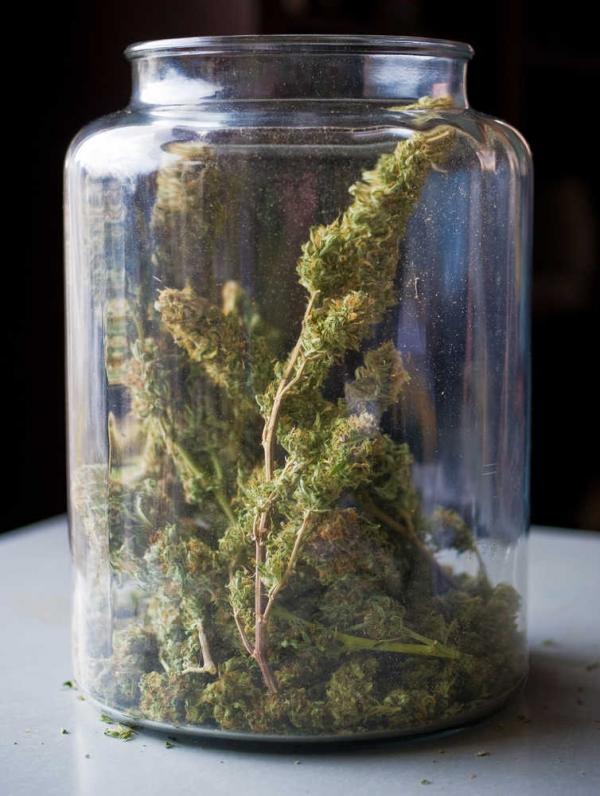Dozens of Alaskans took to their phones Thursday for one of the last chances to weigh in on the state’s proposed commercial marijuana regulations.
Thursday was the first day of a two-day public comment period in Anchorage, and residents from across the state used the opportunity to give their opinions. Barely one month remains in the timeline set by voters in November when they legalized the commercial sale and recreational use of marijuana by a six-point margin.
According to Ballot Measure No. 2, the state has until Nov. 24 to approve regulations that create a marijuana industry. By Feb. 24, it must begin accepting license applications. By May 25, it must have issued the first license.
The state appears to be on schedule for those deadlines.
On Thursday, most of the public comments focused on a single provision in the proposed regulations, a section called 306.900. That provision prohibits licenses for social clubs — places that don’t sell marijuana but allow it to be smoked (or otherwise consumed) in semi-private surroundings.
Attorneys have advised the five-member Alaska Marijuana Control Board that it lacks the authority to authorize the clubs because Ballot Measure No. 2 — now a part of state statute — didn’t explicitly allow them. That leaves Alaska’s marijuana industry with a huge problem.
“We get 1 million tourists who pass through Juneau each year and will buy all kinds of products, but have nowhere to consume them,” said Zach Bowhay of Juneau during his testimony. “We’re almost forcing people to commit a crime.”
“I feel that section 306.900 needs to be removed,” said Charles Weaver, testifying by telephone. “We voted for (marijuana) to be regulated to be similar to alcohol.”
According to Cynthia Franklin, executive director of the marijuana control board, this approach is regulating marijuana similarly to alcohol. State statutes explicitly prohibit “bottle clubs,” and Franklin has said that the state’s attorneys believe marijuana clubs more closely resemble the prohibited clubs than legal alcohol establishments like bars. Marijuana cannot be consumed inside retail stores, or in public. The only legally protected place to consume it is inside a private home — and many landlords prohibit marijuana.
Anchorage resident Fred Lopez said he understands the state’s legal interpretation, but “it just seems to me to be wrong to prohibit something and not give it another outlet.”
Others who testified raised concerns with the state’s proposed limits on marijuana concentrates, substances that result when the psychoactive components of marijuana are condensed in a chemical process. Regulation 306.545 caps concentrate potency at 76 percent THC, akin to the state’s limits on the proof of alcohol. Pure or near-pure alcohol like Everclear is prohibited in Alaska. Only liquor that is less than 76 percent alcohol (151 proof or less) is allowed.
“If you don’t allow a higher commercial limit,” warned Jessica Jansen, testifying in Anchorage, “the black market’s going to do it for the industry, and they’ll be able to sell those over-76-percent products.”
In Juneau, James Barrett of Rainforest Farms LLC was the sole person to testify in person at a conference room set up for the purpose.
Rainforest Farms intends to grow marijuana for Juneau-area stores, and Barrett told the control board that he hopes it will modify its proposed advertising restrictions to allow Rainforest to donate its product to silent auctions and other charitable efforts.
After his testimony, he said Rainforest “want(s) to be involved in the community like Alaskan Brewing is.”
That company — Alaska’s largest brewery — has managed to promote itself in a way that doesn’t support the idea of drunkenness, he said, and he hopes Rainforest can do the same.
Barrett said he also supports revisions to the proposed regulations that would allow Outside investors to invest in Alaska marijuana businesses. His business is supported by Alaska investors, but limiting investment may make it more difficult for others, he said.
Currently, regulation 306.015 requires every partner or shareholder in an Alaska marijuana business to be a resident of the state.
“When you restrict funding, it only hurts people who need it,” said Frank Berardi, the chairman of the Coalition for Responsible Cannabis Legislation, in testimony. “It makes it unreasonably unfeasible for the average person to operate.”
A second day of testimony is scheduled from 9 a.m. to 4 p.m. today. Callers can participate at 1-844-586-9085, and Juneau residents can visit the Beltz Room of the Thomas Stewart Building to participate in person at 3 p.m.

